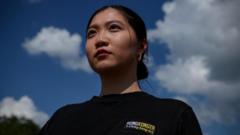Hong Kong police have apprehended the relatives of Anna Kwok, a prominent pro-democracy activist residing in the US, for allegedly aiding her financially. Reports indicate that this is the first occasion when family members of an "absconder" have faced charges under the territory's national security law, according to information provided by Reuters.
Authorities claim that the 26-year-old Kwok breached the national security laws after participating in the pro-democracy protests of 2019. Following her departure from Hong Kong in 2020, she took on the role of Executive Director at the Hong Kong Democracy Council (HKDC), an organization based in Washington DC.
The police arrested two men, aged 35 and 68, on suspicions of dealing with "funds or other financial assets" associated with Anna Kwok. Local media identified them as her father Kwok Yin-sang and brother. According to the South China Morning Post (SCMP), the investigation into the family members was initiated after police recorded their meetings with Anna Kwok overseas.
Kwok Yin-sang, the elder man, is accused of trying to handle his daughter's insurance policy upon returning to Hong Kong, which could be utilized to obtain funds for her. Reports indicate that he has been denied bail by a national security judge, Victor So, at the West Kowloon Magistrates' Courts. Conversely, his 35-year-old son, who is also accused of supporting their father's efforts, has reportedly been granted bail pending further investigations.
The Safeguarding National Security Bill prohibits any assistance, directly or indirectly, to individuals labeled as absconders. In 2023, the Hong Kong administration placed bounties on several pro-democracy activists, including Anna Kwok, accusing them of colluding with foreign forces—a charge that could lead to life imprisonment.
In response to the bounty placed on her, Anna Kwok has criticized the government's actions as an intimidation tactic aimed at silencing dissent. "That's exactly the kind of thing the Hong Kong government and the Chinese Communist Party would do—to intimidate people into not doing anything, silencing them," she expressed during an interview with BBC's Newshour.
Originally, a British colony, Hong Kong was handed over to China as a special administrative region in 1997. While Hong Kong is supposed to maintain certain freedoms not found in mainland China, observers note a notable decline in these liberties.






















